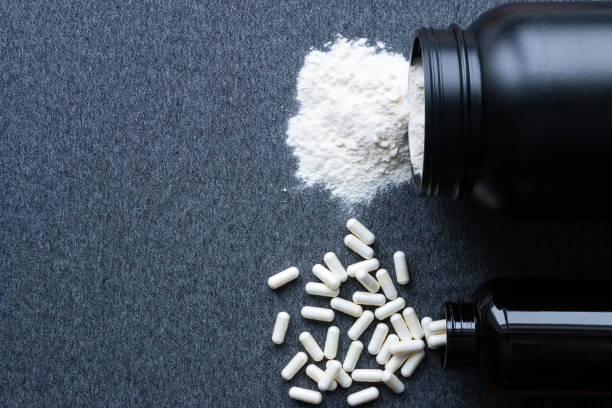Creatine and Cardio: The Truth About Maximizing Your Workout
Creatine and Cardio: Boost Your Endurance and Performance
Creatine has gained popularity as a powerful supplement for enhancing exercise performance, especially during strength training and high-intensity workouts.
But can creatine improve your cardio performance?
This article explores the science behind creatine and cardio, detailing how it affects endurance, high-intensity interval training, and overall cardiovascular health.

Article Outline
- What Is Creatine?
- How Does Creatine Work?
- The Effects of Creatine on Cardio Performance
- Benefits of Creatine for Endurance Athletes
- Creatine and High-Intensity Interval Training
- Does Creatine Help with Cardiovascular Health?
- How to Take Creatine for Cardio Workouts
- Potential Side Effects of Creatine Supplementation
- Creatine vs. Other Supplements for Cardio
- Conclusion: Is Creatine Worth It for Cardio?

What Is Creatine?
Creatine is a compound found naturally in the body and in foods like red meat and fish. It is stored primarily in muscles as creatine phosphate, which is used to regenerate ATP—the primary energy source for cellular activities.
Learn more about the benefits of creatine supplements in our ultimate guide.
How Does Creatine Work?
Creatine’s primary role is to help regenerate ATP, especially during short bursts of high-intensity exercise. By increasing the availability of ATP, creatine allows muscles to sustain activity for longer periods.
For a deeper dive, check out how creatine works.
The Effects of Creatine on Cardio Performance
Studies suggest that creatine supplementation may improve endurance performance.
A study found that creatine increases the amount of training endurance athletes can complete, potentially enhancing aerobic power.
Read our comparison of creatine monohydrate vs. HCL.

Benefits of Creatine for Endurance Athletes
Creatine may help endurance athletes by boosting their ability to recover during training sessions. This can lead to better aerobic power and cardiovascular efficiency over time.
Learn about creatine supplementation benefits.
Creatine and High-Intensity Interval Training
High-intensity interval training relies on quick energy bursts, making creatine especially useful. Creatine helps regenerate energy quickly, improving performance and recovery during intervals.
For an in-depth look at training benefits, explore our creatine and interval training guide.
Does Creatine Help with Cardiovascular Health?
Emerging research suggests that creatine may support heart health. While more studies are needed, early findings indicate that creatine supplementation may improve cardiovascular efficiency.
Learn more in our article on creatine and cardiovascular health.

How to Take Creatine for Cardio Workouts
To maximize the benefits, take creatine consistently. The recommended dose is 3-5 grams per day. Taking it post-workout may improve absorption.
Read our article on the best time to take creatine.
Potential Side Effects of Creatine Supplementation
Creatine is generally safe but can cause minor side effects like bloating. Always consult a doctor if you have pre-existing health conditions.
Learn more about potential side effects.
Creatine vs. Other Supplements for Cardio
Compared to other supplements, creatine offers unique benefits by directly enhancing ATP production. It’s particularly effective for combining endurance and strength training.
Discover how creatine compares to other supplements.

Conclusion: Is Creatine Worth It for Cardio?
Creatine offers numerous benefits for both high-intensity and endurance activities. By improving ATP regeneration, it boosts cardio performance and recovery.
For safe and effective use, follow dosing guidelines and monitor your body’s response.

FAQ: Creatine and Cardio – Boosting Your Endurance and Performance
1. What is a creatine supplement, and how does it work?
A creatine supplement helps regenerate adenosine triphosphate (ATP), the energy source for muscle activities. It’s especially effective for high-intensity exercise, allowing muscles to work harder and recover faster.
👉 Learn more in our ultimate guide to creatine supplements.
2. Should I supplement with creatine for cardio exercises?
Yes! Creatine can enhance aerobic exercise performance by boosting muscle creatine content and improving recovery between sessions.
👉 Explore how creatine benefits cardio sessions and other training programs in our creatine monohydrate gummies guide.
3. How does creatine supplementation affect high-intensity exercise?
Creatine is its ability to improve high-intensity exercise performance by increasing creatine stores and regenerating ATP quickly. This is particularly helpful for resistance training and interval training.
👉 Discover the influence of creatine on high-intensity exercises here.
4. Can creatine increase muscle performance during endurance exercises?
Yes, creatine supplementation may improve endurance performance in the long term by enhancing muscle creatine content and reducing muscle fatigue during aerobic workouts.
👉 Learn how creatine boosts endurance exercises in our creatine vs. pre-workout comparison.
5. When is the best time to take creatine supplements?
While creatine can be taken anytime, many studies recommend a dose of 3-5 grams of creatine per day post-workout to optimize absorption and recovery.
👉 Read more about the best time to take creatine.
6. Is it safe to take creatine daily?
Yes, creatine is generally safe for daily use. The International Society of Sports Nutrition has concluded that long-term creatine supplementation is safe for most healthy individuals.
👉 Learn about the safety of creatine supplementation.
7. Does creatine cause side effects like bloating?
Creatine can cause mild side effects like bloating or water retention in some individuals, especially during a loading phase. Adjusting the dose may help.
👉 For more details, explore the side effects of creatine.
8. How does creatine compare to other supplements for cardio?
Creatine offers unique advantages over other supplements, such as enhancing muscle creatine content, improving recovery, and supporting both aerobic and resistance training.
👉 Check out our comparison of creatine vs. whey and creatine vs. pre-workout.
9. Does creatine improve running performance?
Yes! Research has found that creatine supplementation can boost running performance by reducing muscle fatigue and increasing energy availability.
👉 Learn about creatine for runners in our dedicated guide.
10. Can I take creatine supplements without working out?
While creatine is most effective when paired with a training program, taking it without exercise can still increase creatine levels and improve overall energy availability.
👉 Discover the impact of taking creatine without exercise here.

Key Takeaways:
- Creatine enhances ATP regeneration, improving endurance and recovery.
- It is beneficial for high-intensity interval training and cardio exercises.
- Daily supplementation of 3-5 grams is effective for most athletes.
- Consult a doctor before starting if you have health concerns.
References
"Effects of Creatine Supplementation on Endurance Performance." Journal of the International Society of Sports Nutrition, 2023, pubmed.ncbi.nlm.nih.gov/37096381.
For More Training Advice + Diet and Lifestyle visit us Combat Creatine
PS: Make sure you check out the rest of our Training Guides:
Creatine
Creatine Supplements Ultimate Guide
Creatine Supplementation Side Effects
Best Creatine Monohydrate Gummies Review: Top 10 Best Creatine Gummies












